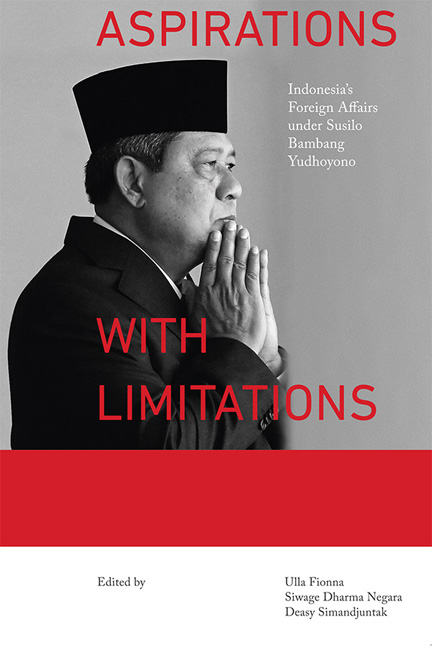Book contents
- Frontmatter
- Contents
- About the Contributors
- 1 Introduction
- 2 Indonesian Foreign Policy: Waging Peace, Stability, and Prosperity
- 3 Indonesia's Diplomatic and Strategic Position under Yudhoyono
- 4 International Economic Cooperation during the Yudhoyono Presidency
- 5 First Term Right, Second Term Shy: A Review of Indonesia's Economic Links with Key Trading Partners
- 6 International Labour Migration: A Very Mixed Blessing
- 7 Law Enforcement, Prevention, and Deradicalization: How SBY Handled Terrorism
- 8 Drifting towards Dynamic Equilibrium: Indonesia's South China Sea Policy under Yudhoyono
- 9 Uneasy Neighbours: Indonesia–Malaysia Relations under Yudhoyono
- 10 A Fair Dinkum Partnership? Australia–Indonesia Ties during the Yudhoyono Era
- 11 The Aceh Peace Process: Wheeling and Dealing behind Closed Doors
- Index
4 - International Economic Cooperation during the Yudhoyono Presidency
Published online by Cambridge University Press: 08 June 2019
- Frontmatter
- Contents
- About the Contributors
- 1 Introduction
- 2 Indonesian Foreign Policy: Waging Peace, Stability, and Prosperity
- 3 Indonesia's Diplomatic and Strategic Position under Yudhoyono
- 4 International Economic Cooperation during the Yudhoyono Presidency
- 5 First Term Right, Second Term Shy: A Review of Indonesia's Economic Links with Key Trading Partners
- 6 International Labour Migration: A Very Mixed Blessing
- 7 Law Enforcement, Prevention, and Deradicalization: How SBY Handled Terrorism
- 8 Drifting towards Dynamic Equilibrium: Indonesia's South China Sea Policy under Yudhoyono
- 9 Uneasy Neighbours: Indonesia–Malaysia Relations under Yudhoyono
- 10 A Fair Dinkum Partnership? Australia–Indonesia Ties during the Yudhoyono Era
- 11 The Aceh Peace Process: Wheeling and Dealing behind Closed Doors
- Index
Summary
After the Reformasi era, Indonesia underwent a historic political transition, culminating in the peaceful direct presidential election of 2004 in which Susilo Bambang Yudhoyono, popularly known as “SBY”, was elected as the sixth president of Indonesia. Under President SBY, Indonesia managed to regain its economic footing. The country was the hardest hit by the 1997 Asian financial crisis, which caused its real gross domestic product (GDP) to fall by thirteen per cent in 1998. It was during the SBY presidency that Indonesia managed to rebuild its economy and achieve a respectable level of growth of around six per cent, close to the pre-crisis levels.
As the country had just recovered from the financial crisis, Indonesia faced many economic challenges during SBY's term, including crumbling infrastructure, an unstable financial market, high unemployment, and an increase in the poverty rate. Given these challenges, SBY and his economic team had arguably succeeded in putting Indonesia back on the investors’ radar. It is debatable, however, whether Indonesia's strong economic growth during SBY's administration was due to good management or merely good luck (Basri 2012). As a resource-rich country, Indonesia benefited from the commodity boom, which happened during the SBY presidency.
Regardless of the cause, Indonesia's relatively stable domestic politics and improved macroeconomic conditions to some extent set the foundation for Indonesia's regional and international economic engagement of “a million friends and zero enemies”. The slogan was seen as SBY's hallmark foreign policy to thrust Indonesia into a new global limelight as an unlikely star (Soesastro 2009). “A million friends and zero enemies” was a vision introduced by SBY in his effort to gain as much support as possible for Indonesia's national development and to advance its reputation in the region and the world. In fact, Indonesia during SBY's presidency tried to exploit several regional and international platforms to promote its vision of international economic cooperation.
The 2008 global financial crisis (GFC), along with a rising tide of protectionism around the world, however, represented a turning point in SBY's stance towards open regionalism and globalization. In spite of the changing political and economic dynamics at home, SBY's administration still managed to secure a foothold for Indonesia in many regional and global forums through its strategic contributions.
- Type
- Chapter
- Information
- Aspirations with LimitationsIndonesia's Foreign Affairs under Susilo Bambang Yudhoyono, pp. 60 - 82Publisher: ISEAS–Yusof Ishak InstitutePrint publication year: 2018

